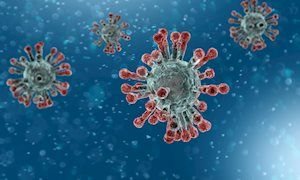3 October 2019
This means they can now test out the smart shirts with patients who have chronic obstructive pulmonary disease (COPD). If successful, they hope this will allow doctors to monitor patients remotely for early signs that their condition is getting worse. The research was presented by Denise Mannée, a technical physician and PhD candidate at Radboudumc.
In a release she said: "COPD is a growing problem with around 64 million people suffering with the condition worldwide. When patients suffer an increase in their symptoms, such as coughing and breathlessness, they need to be monitored more closely. Symptoms first occur during daily activities like climbing stairs and housework, but respiration is hard to monitor in such conditions. This is traditionally done in the clinic with equipment such as an exercise bike, facemask, and computer. The equipment is not very practical for measuring everyday activity.
The smart shirt, called the Hexoskin, senses when the wearer's chest expands and contracts and uses these measurements to gauge the volume of air inhaled and exhaled. It also records heart rate and movement. Mannée and her colleagues asked a group of 15 healthy volunteers to wear a smart shirt while doing everyday activities including lying down, sitting, standing, climbing stairs and vacuuming.
At the same time, the volunteers also wore the equipment traditionally used to measure breathing that includes a face mask and a bulky backpack. The volunteers repeated the tasks wearing both pieces of equipment, to generate a second set of data.
The researchers now plan to repeat tests on the smart shirts with COPD patients, but they believe the technology might also help in other respiratory conditions such as asthma, cystic fibrosis or after transplantation.
Abstract Denise Mannée et al - Tidal volumes during tasks of daily living measured with a smart shirt
See also: ‘Smart shirt’ can accurately measure breathing and could be used to monitor lung disease
Denise Mannée is member of theme Healthcare improvement science.

This means they can now test out the smart shirts with patients who have chronic obstructive pulmonary disease (COPD). If successful, they hope this will allow doctors to monitor patients remotely for early signs that their condition is getting worse. The research was presented by Denise Mannée, a technical physician and PhD candidate at Radboudumc.
In a release she said: "COPD is a growing problem with around 64 million people suffering with the condition worldwide. When patients suffer an increase in their symptoms, such as coughing and breathlessness, they need to be monitored more closely. Symptoms first occur during daily activities like climbing stairs and housework, but respiration is hard to monitor in such conditions. This is traditionally done in the clinic with equipment such as an exercise bike, facemask, and computer. The equipment is not very practical for measuring everyday activity.
The smart shirt, called the Hexoskin, senses when the wearer's chest expands and contracts and uses these measurements to gauge the volume of air inhaled and exhaled. It also records heart rate and movement. Mannée and her colleagues asked a group of 15 healthy volunteers to wear a smart shirt while doing everyday activities including lying down, sitting, standing, climbing stairs and vacuuming.
At the same time, the volunteers also wore the equipment traditionally used to measure breathing that includes a face mask and a bulky backpack. The volunteers repeated the tasks wearing both pieces of equipment, to generate a second set of data.
The researchers now plan to repeat tests on the smart shirts with COPD patients, but they believe the technology might also help in other respiratory conditions such as asthma, cystic fibrosis or after transplantation.
Abstract Denise Mannée et al - Tidal volumes during tasks of daily living measured with a smart shirt
See also: ‘Smart shirt’ can accurately measure breathing and could be used to monitor lung disease
Denise Mannée is member of theme Healthcare improvement science.
Related news items

More than five million euros for research to improve palliative care Jeroen Hasselaar will lead research project with Horizon grant
15 June 2022 Jeroen Hasselaar will lead a large international research project. With a 5.3 million euro grant from the EU's Horizon program, he and his team want to improve palliative care for cancer patients, together with partners from nine European countries. go to page
Most COVID-19 ICU survivors experience symptoms one year after ICU admission Publication in JAMA
25 January 2022 75% of the COVID-19 survivors who were treated in the Intensive Care Unit (ICU) experience physical, mental and/or cognitive problems one-year post ICU. This shows the large-scale MONITOR-IC study led by Radboudumc. go to page
1.4 million euro to reduce hospital admissions due to medication
7 January 2022 A team of sixteen Dutch hospitals received a grant of 1.4 million euros from ZonMw. They will investigate whether they can reduce medication related hospital readmissions. go to page
Participating in cancer research among people with intellectual disabilities
30 November 2021 Thanks to the support of the Maarten van der Weijden Foundation research was carried out into the participation of people with intellectual disabilities in (population) screening for cancer. go to page

